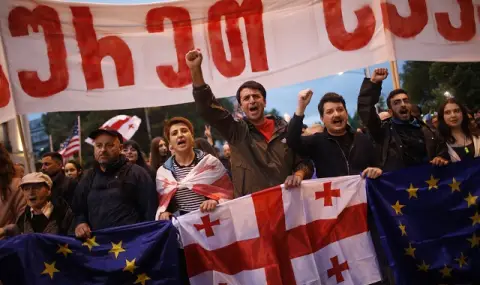Georgians are urged to vote tomorrow in parliamentary elections crucial for the future of the country, in which pro-European opposition formations and the ruling party, accused of pro-Russian authoritarian deviations, are opposed.
The EU fears that Tbilisi is moving away from its ambition to join the bloc, even though this goal is enshrined in the Georgian constitution. The EU fears that Georgia may become closer to Moscow.
Recent polls show that an alliance of opposition parties could gather enough votes to defeat the ruling party “Georgian Dream” of the billionaire Bidzina Ivanishvili, accused of pulling the strings of power in the shadows for ten years.
Georgia's traditionally divided opposition forces have managed to form an unprecedented front against the ruling party. Among this opposition quartet is the United National Movement of former Georgian President Mikheil Saakashvili, the “black sheep” of Ivanishvili.
The program of the four opposition parties, united in an alliance, envisages, in particular, major electoral and judicial reforms and the repeal of recently promulgated laws pushed by the ruling party that have generated controversy and criticism.
„But if the ruling party tries to stay in power regardless of the election result, there is a risk of post-election unrest”, warns expert Gela Vazadze from the Center for Strategic Analysis on Georgia.
On Sunday, a week before the water, tens of thousands of pro-EU protesters gathered in Tbilisi, a sign of still strong aspirations for rapprochement with the EU, especially among younger generations.
In response, the ruling party bussed tens of thousands of its supporters, including government officials, to a rally on "Freedom Square" on Wednesday evening. in the center of Tbilisi.
„If the opposition comes to power, it will start a war against Russia,” assured Tamila Siradze, a 70-year-old participant in this demonstration.
„Georgian Dream”, which has been in power since 2012, has been accused of going down a pro-Russian authoritarian spiral and driving Georgia away from the EU as well as NATO, which Tbilisi also wants to join.
p>
Some of the leaders of “Georgian Dream“ are very critical of the West. Bidzina Ivanishvili called the West a “World Party of War”, which will treat Georgia, which has become its victim, as “smoke meat”.
In an interview published this week, Ivanishvili even assured that there are orgies on the streets of the West.
Georgia, a former Soviet republic, remains deeply scarred by Russia's invasion during a brief war in 2008. Russia then deployed military bases in Georgia's two separatist regions – Abkhazia and South Ossetia, which it recognized as independent states.
In this context, the ruling party campaigns by presenting itself as the only one capable of preventing the alleged “Ukrainization” of Georgia.
The government says it wants to win three-quarters of the seats in parliament, a broad majority that would allow it to change the constitution and, according to its plan, ban pro-Western opposition parties.
Pro-European president Salome Zurabishvili, who broke ties with the government, described things in an interview with France Press in October saying: “It will be something like almost a referendum on the choice between Europe or a return to an uncertain Russian past”.
p>
Georgia was gripped in May by large protests against a foreign influence law criticized by the West and inspired by Russian foreign agent legislation used in Russia to silence dissident voices.
Brussels then froze Georgia's EU accession process and the US imposed sanctions on Georgian officials accused of authorizing the brutal crackdown on protests. Tbilisi reacted by threatening to review its diplomatic relations with Washington.
Russia remains a historical player in the Caucasus and is the country where Ivanishvili made his fortune after the collapse of the USSR.
An indication of the challenge of the elections in Georgia is that the Kremlin has accused the West of covert interference in them.
The latest cause of tension between Brussels and Tbilisi was the promulgation in early October of a law severely restricting the rights of the LGBT community.
According to Tamar Jackeli, an activist from the LGBT community, interviewed this week by AFP, this law is being used to divert attention from the real problems of the Georgian population – poverty and mass emigration.
Translated from French: Gabriela Golemanska, BTA
